WILM meeting Music In Africa & Carine Tredgold
By Sound engineer & co-founder of WILM, Malle Kaas
 The classroom at Music In Africa’s offices
The classroom at Music In Africa’s offices
WILM in South Africa November 2021
After loads of stress due to a PCR test arriving late, and a fellow trainer that had to cancel last minute, plus a couple of other obstacles, I was finally on the KLM flight to Johannesburg in South Africa!
The main reason for going there was a merger between the African foundation Music In Africa (MIA) and WILM for the week long training program called ‘Gender@Work which included eleven young women from all across Africa.
My role there was to teach live sound, as well as assist the lovely and extremely hardworking and dedicated Carine Tredgold, a female stage manager from Zimbabwe and the head of the MIA training program, which she has been running for the last couple of years with great success.
For seven straight days she would take the women through everything they needed to know about a festival production: Stagemanagement, Sound, Light, Production, Artist Liaison etc.
The first training day:
When I met the girls on the first day, I was impressed by meeting eleven women, ages 23 to 37, so strong, so funny and so curious and eager to learn. They were all coming from very different backgrounds, as well as various levels of experiences and training within live events. They had never met before and still it only took them less than a day to be talking with each other like long term friends. A quality I would learn is very usual for women from the African continent……as well as singing together at the dinner table the first night! It was a remarkable experience for me as a Scandinavia, to sit together with them at dinner the very first night – and they would be singing spontaneously together so beautifully, sounding like one voice – and have just met.
Both the singing and dancing was something I would learn the girls would do at any given chance – no being shy here. I was impressed, and couldn’t stop smiling the entire week with these amazing and inspiring women from all over Africa.
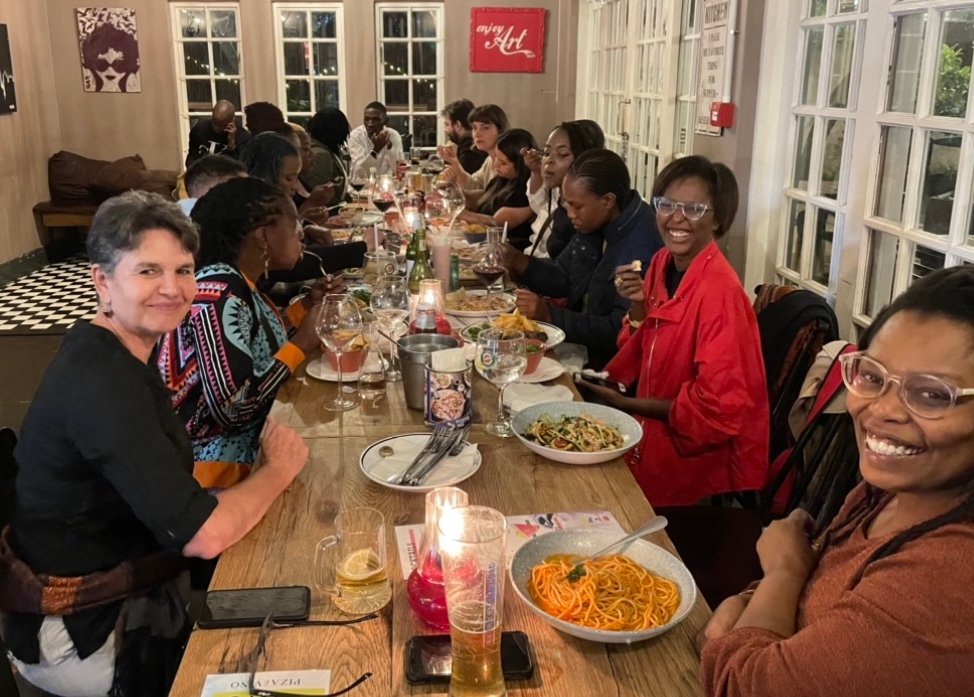 All together at dinner the first night: At front to the left, Stagemanager Carine, to the right M.I.A Projectmanager Violet
All together at dinner the first night: At front to the left, Stagemanager Carine, to the right M.I.A Projectmanager Violet
Did I mention already this was my first trip to the African continent? I quickly learned that Africans are very glorious when it comes to their background. It is important for them that people outside of Africa understand that each country has its very own story, culture and own music.
And still it was so fascinating to watch these girls from Senegal, Zimbabwe, Kenya etc connect so quickly across borders and differences – something that was characteristic for their way of working together the rest of the week – Indeed something we could learn from here in Europe!
On this very first training day we had a guest visit from Jess White, ‘Akum Agency’ – A festival curator, manager, booker and much more. And he had a very important message for the girls about social awareness: Be concerned towards what your artists are associated with. If an artist would be known for abusive behavior for instance towards
women, Jess would immediately let go of that artist. Something you would wish more managers, bookers etc would have the guts to do in Northern Europe where I’m from. Jess also had another advice for the girls when it came to handling difficult artists: Kill them with kindness….and professionalism.
On the 2nd day:
We had now moved out of the office of MIA with the beautiful view over Johannesburg, and into the location of the Goethe Institut down the street.
First lecture that day was with a true power woman: Ghita Khaldi from Morocco. Ghita is in charge of coordination and production for the festival L’boulevard in Casablanca, a festival that would allow underground music to play for a national and international audience: Hiphop, Metal, Pop, Rock – genre we would take for granted in Europe, would here have a chance to perform instead of being banned like they would normally be in Morocco from other live performances ( or even arrested for playing in public), as well as not being aired on the radio. So brave that Ghita and her crew would stand up and create a space for these genres in Morocco.
Ghita also had another project under her wings. “Afrikayna” (means ‘Africa is here’), a project that helps traditional African musicians to connect and exchange knowledge about their music and instruments across the entire continent. One of the finest tasks of Afrikayna’s agaenda is the important collection of traditional African instruments in order to preserve the history these old instruments would tell from the north bank of the Sahara to the southern neighbors beaches.
 The amazing Productionsmanager from L’boulevard Festival in Casablanca, Ghita Khaldi
The amazing Productionsmanager from L’boulevard Festival in Casablanca, Ghita Khaldi
The rest of the day the girls would continue the lectures from the day before about festival planning, performance preparation, crisis management and much more about the entire production behind a festival. I felt so happy to be part of this and lucky to be able to listen to all the great information and experiences that Carine, head of the training had prepared for the students.
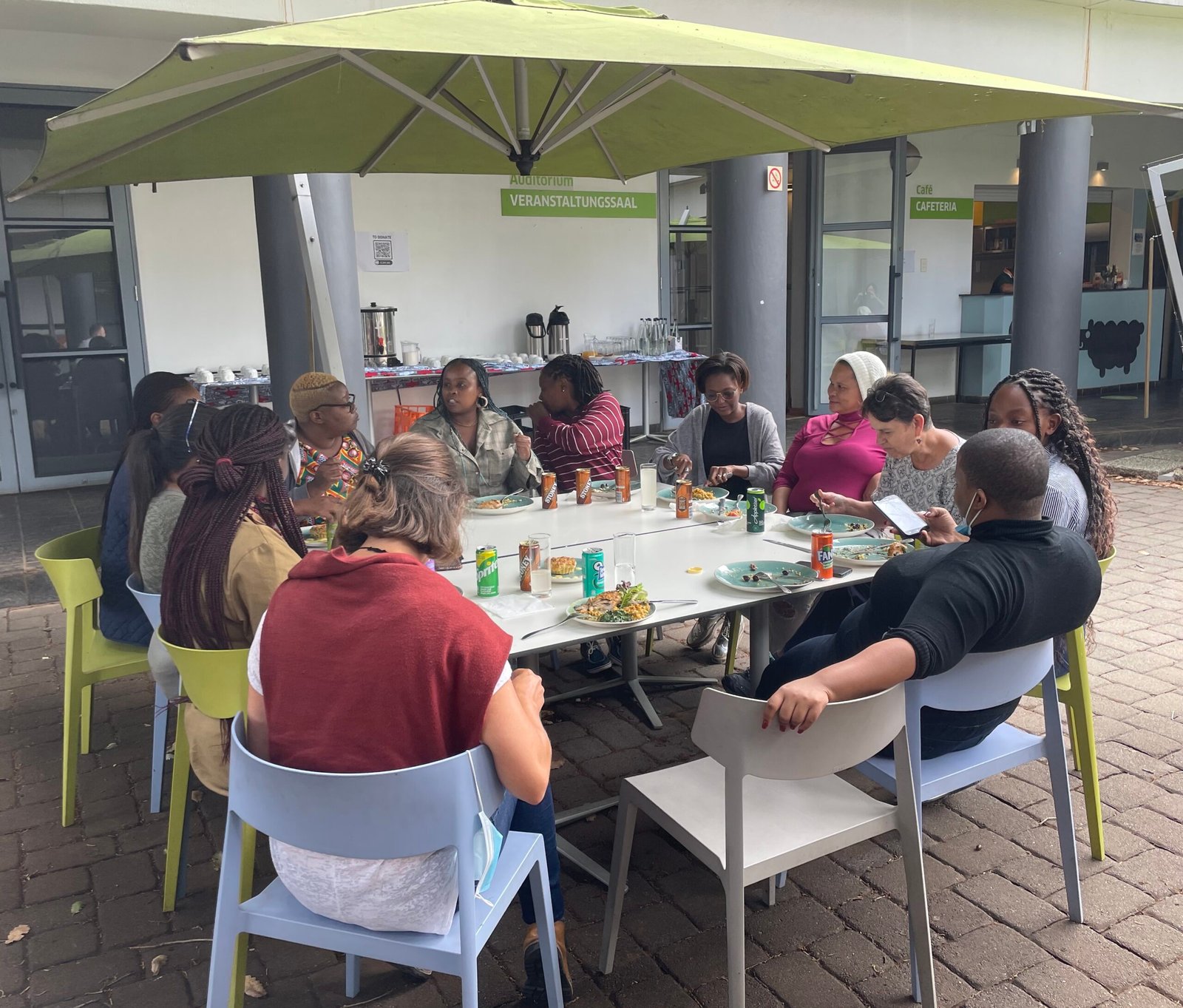 Lunch in the yard of the Goethe Institut, Johannesburg
Lunch in the yard of the Goethe Institut, Johannesburg
The 3rd day – Tech day:
Today the girls were introduced to the technical aspect of a festival. Though many of the girls already had a background in light and sound, there were still lots for them to learn. Especially on how things are in Europe on larger scale productions.
First we would go through the career and workflow of a Lighting designer and lighting technician, as well as what gear would be used as standard in most of Europe. Then we had the fortune of having an ‘Avantis’ Allen&Heath console to practice live sound on. With the use of the mixing console we would go through the important details for a sound check, like for instance how to communicate to and with musicians.
We would at the same time go through the riders for the ACCESS festival – Yes, because the trainees were going to be part of the local crew as interns for MIA’s own showcase festival that was running for three days with some of the biggest artists from Africa continent.
But to see these girls on the 3rd day, still so inquisitive, was so amazing and touching. When we had set up the mixing board, it was great to see their curiosity and eagerness, and there was absolutely no fear of gear! Again incredible to see how they would work together.
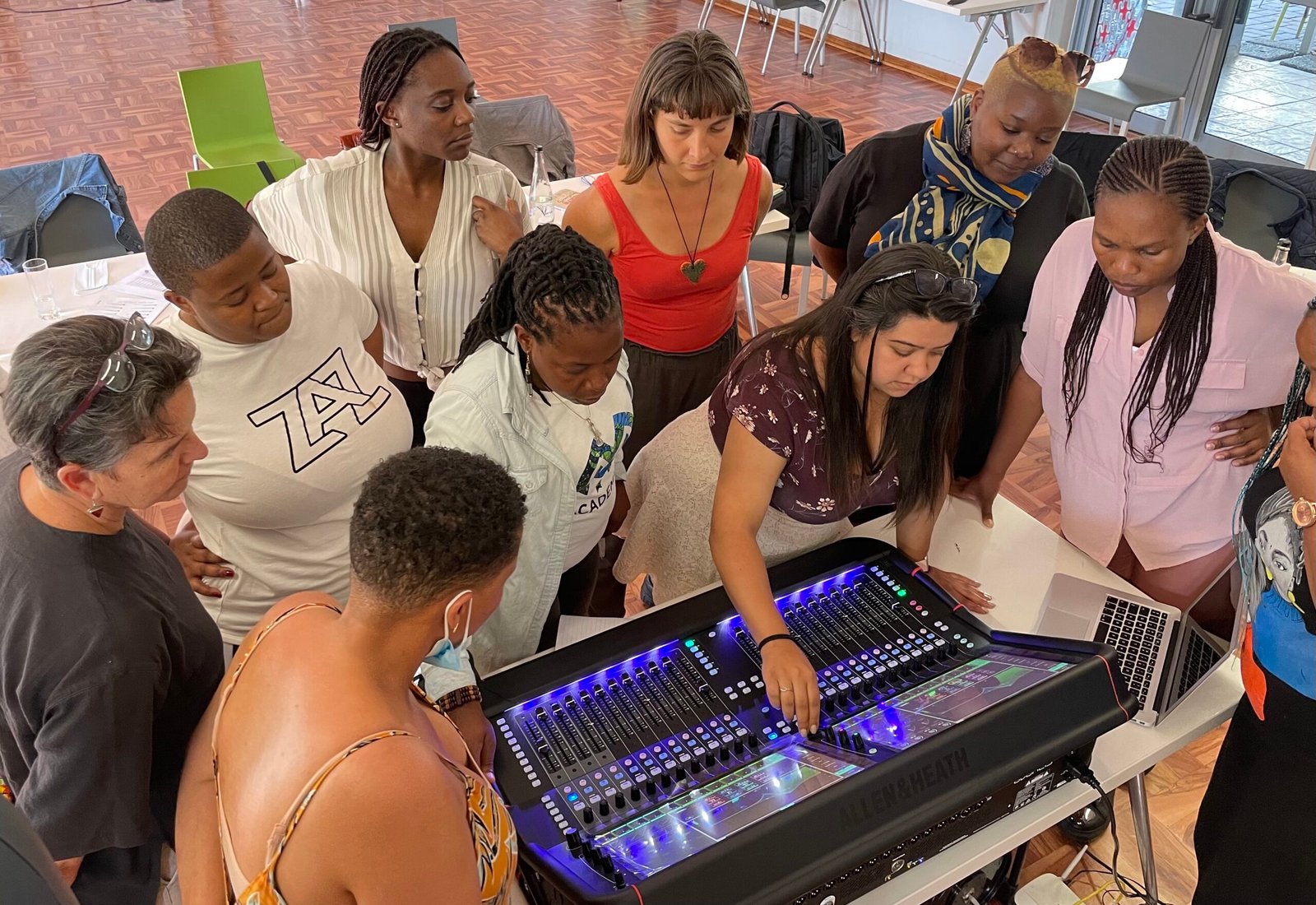 The girls checking out ‘Avantis’ from Allen&Heath
The girls checking out ‘Avantis’ from Allen&Heath
4th day – and first day onsite the ACCESS festival
The ACCESS festival is a three-day long showcase combined music and conference festival with some of the finest musicians, including leading people from the music industry all over Africa. According to the training program the girls were planned to take part of the festival in different roles covering Stagemanagement, Artist liaison and Sound engineering.
On this very first day onsite they were helping finish the last details before Showday no.1. Again I was so impressed by seeing these girls work as one unit. Everyone was making sure everyone was okay, and aware of their roles.
I was supposed to supervise stage interns. But in less than an hour they made it clear that my guidance was ‘not needed’. I was still keeping an eye on them for the first couple of hours, but they were doing just fine – And I could not be more happy for them.
Now it was my turn to learn! I am not used to that All bands would get a decent soundcheck the day Before showtime! But on the African continent that seems to be the case! So that’s what we would be doing the first day onsite. Surprisingly enough the girls would line up in front of the stage, when they were on a break from their other duties, and then they would sing along and dance. Something you would never see in Europe – That the crew would be dancing in front of the stage during soundcheck! But again – what’s the fuzz, it’s all about music (though I would be too shy to dance along)
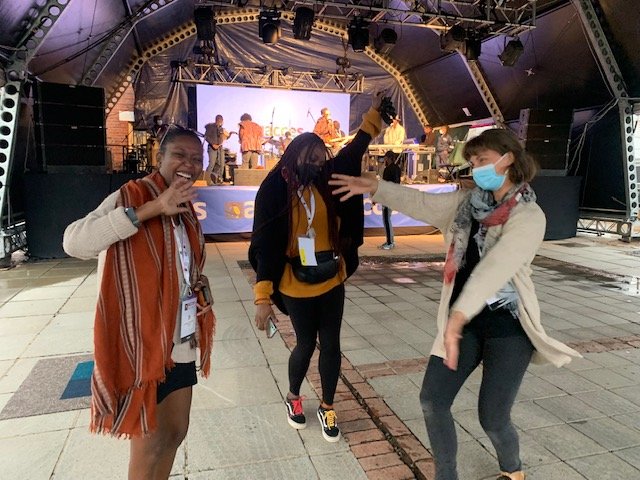 Dancing in the front of the stage at soundcheck was an natural element at the ACCESS Festival
Dancing in the front of the stage at soundcheck was an natural element at the ACCESS Festival
And then I learned a very African term that made me laugh so much, when the girls told me about it: Hurry up – and wait. I totally loved this kind of workflow that reminded me of a mix up between a Danish and a Spanish workflow.
Another thing I learned that day was on a more personal level – the past of the black people during Apartheid. The venue of this festival was on the Constitution Hill – the heart of the devil during Apartheid. This was the old prison and court where both Nelson and Winnie Mandela were convicted and would spend time. My legs were shaking a bit when we walked through the huge and very heavy wooden gate, as one of the girls was whispering ‘Once you get in, you’ll never get out’ It goes beyond my imagination how cruel the human being can be. But as the girls said: ‘We are here to claim the space back and cover it in black african music’ A more beautiful gestus could not be made for this place.
Did you btw know that in South Africa everyone born after 1994 are called ‘Born-free’ as they are growing up without Apartheid!
 A shadow from the horrible past on Constitution Hill
A shadow from the horrible past on Constitution Hill
5th day and First Showday
I have traveled around the globe, but I have never ever experienced a thunderstorm so severe as the one I experienced in Johannesburg one hour before doors! It was raining so heavily that despite a solid roof and every man/woman ‘on deck’ doing what they could, we couldn’t save the sound system. Big discussion on what to do. But luckily everyone kept their head cool, especially the director of M.I.A Eddie Hatitye who decided to go through with the 1st day, as well as head of sound Garrick van der Tuin, who was a true hero! (coming from an experienced sound engineer who can tell), and came up with a functional solution that saved the sound that night!
But what a trip – and as one of the girls said to me: This is an act of God….first I looked at her, then she revealed that this would be in a standard rider ‘Act of God’ in case of a natural disaster.
See that’s a thing you won’t find in a European rider. As well as ‘we will need to have a fire backstage’ The fire is a natural thing to have backstage in most parts of the African continent. This is due to instruments like ‘Zeze’ that needs to be warmed up before coming on stage.
6th day and Second Showday
On this 2nd showday, the local stagemanager came up to Carine and said ‘I’m going home – your girl knows everything, and is better than me.’ We would laugh about it, but it was kind of true. The girl Carine had chosen to be stage manager intern was really on top of her game. So much that M.I.A’s director thought she would be an employee. The same SM intern would tell me a fun little story about how she was handling a band that refused to go on stage on time: SM: I will cut your time, if you don’t go on the stage right now. The Band in a corky tone: Really, so what you gonna do about it, little woman. She looked them straight in the eyes and said with the biggest smile: Try me! – and on the stage they went…..Well, we couldn’t have been more proud. This was a perfect example of kill them with kindness – and professionalism
The same went for ‘my girls’ on stage. They were kicking so much butt that the local stage crew would follow their instructions – not the other way around.
And again I was surprised because I would have expected that the male crew would not approve of these girls. But every time I was passing by, the local crew would tell me how impressed they were of the girls and their workflow. I was happy to hear them say: ‘can we have these girls every time. It is so easy to work with them’.
It was a true pleasure for me to see this diverse crew of men, women, white and black.
 A united stage crew at Music In Africa’s showcase festival ‘ACCESS
A united stage crew at Music In Africa’s showcase festival ‘ACCESS
7th day, 3rd and final showday
But not everything is easy and smooth in South Africa after Apartheid. The black male sound engineers would tell me that it is hard to be hired from the white rental companies that own the majority of sound systems.
And if they get hired the regular staff would speak Afrikaan which hardly any black people speak. I was getting my little share of how it could be even as a white woman (can’t imagine how it must be as a black woman): At some point I was in charge of FOH, and the communication with the monitor world was impossible – I was simply being ignored! The other (black) FOH engineer looked a me, and said with a smile Welcome to my world
This engineer also said something very wise to me, when we were talking about the girls and their adventure at the ACCESS festival: Every Mistake Is A New Beginning – So very true.
If you haven’t been to a concert with music from the African continent you must go the next time you get the chance! Every act was a new gift and I can recommend artists like Laliboi, Ikati, Tommy Wa, Msaki and many others
Good luck to the team of girls attendingGender@work 2021 – Remember Everyone must find their own way, but keep your faith strong.
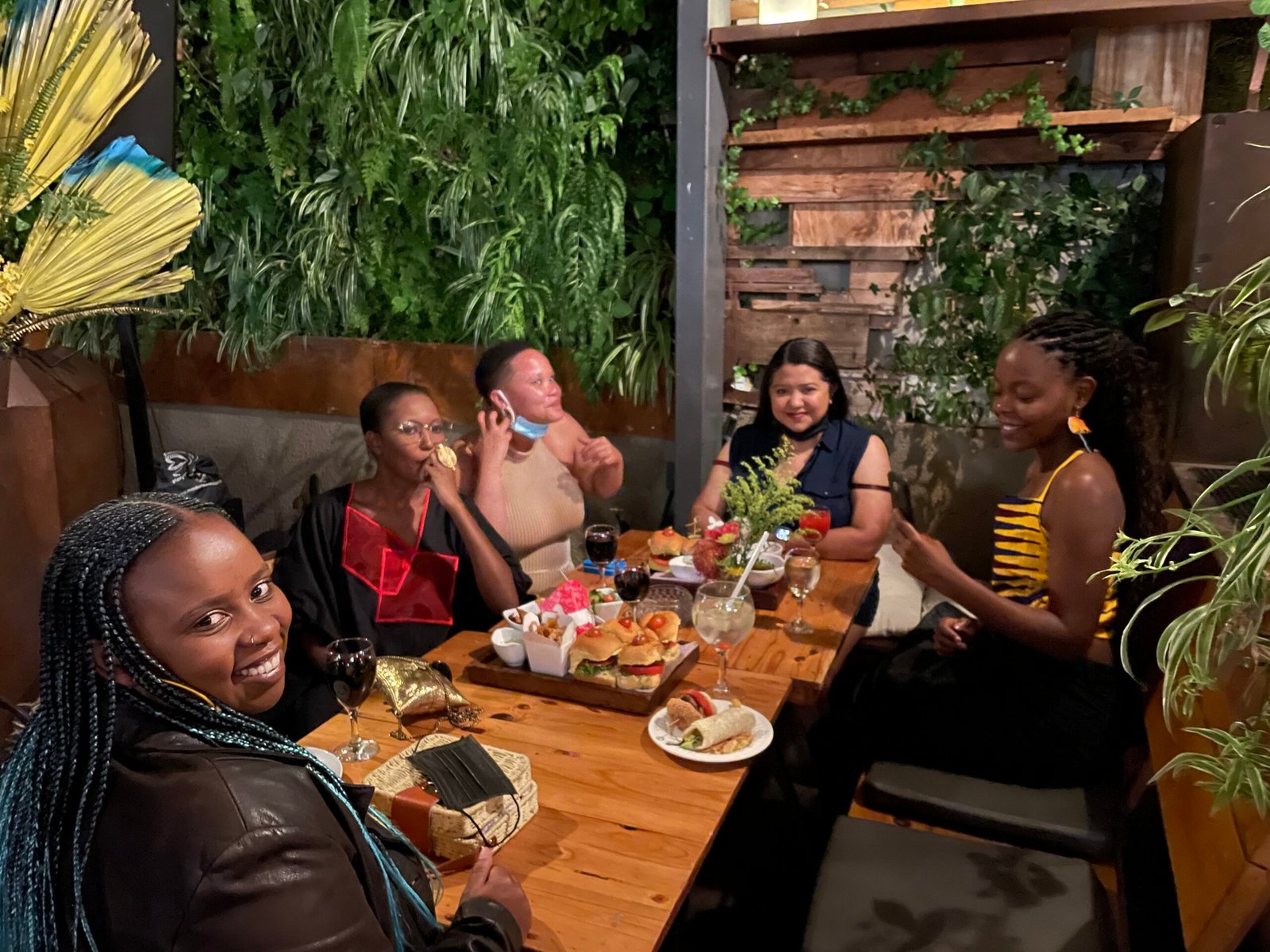 Some of the amazing ladies at a night out at the ‘Living Room’
Some of the amazing ladies at a night out at the ‘Living Room’
Thank you to Siemens Foundation, Prince Claus Foundation and not the least Thank you to Stagemanager Carine Tredgold and Music In Africa for making this project happen! (You Rock Carine)
Thank you to Allen&Heath, AudioSure and Letedi for providing audio gear for our live sound workshop
Live sound engineer and CEO of WILM
Malle Kaas
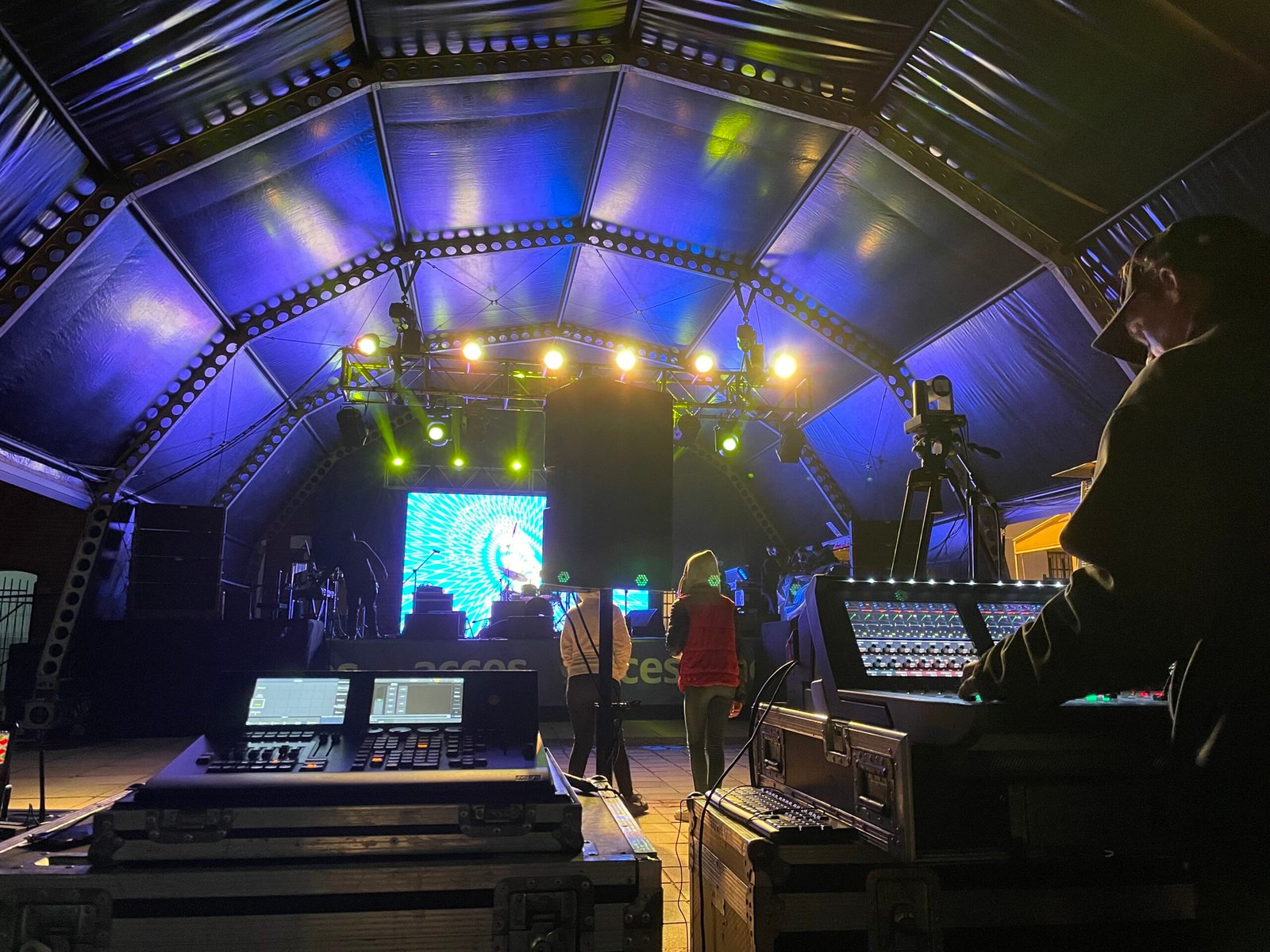 FOH engineer Garrick Van Der Tuin
FOH engineer Garrick Van Der Tuin


